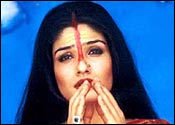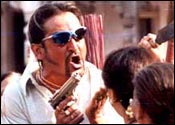 | « Back to article | Print this article |
It is ironic that a film that derives most of its gags at the expense of clichéd Bollywood formulae should itself be so hackneyed in its treatment. Sanjay Jha's debut film Praan Jaye Par Shaan Na Jaye boasts of a fine cast and a promising story, but loses its way because Jha tries too hard to be clever.
Sushmita Sen plays the sutradhar (narrator) and introduces us to the residents of a typical Mumbai chawl before her co-narrator Ganpat (Vijay Raaz) takes over. The story begins with a parody of the famous rain song Ghanana ghanana from Lagaan, as the residents of Popatlal Chunilal Garodiya chawl celebrate the arrival of water in a municipal tap that is usually dry.
Ganpat takes us on a guided tour of the heavily populated housing complex where 49 families live in the cramped confines of their 100-odd square foot homes, share a common toilet -- which hogs a great deal of footage and accounts for some of the non-filmi jokes in the film -- and their joys and sorrows with each other.
Every family has a problem, each more traumatic than the other.
While Suman (Rinke Khanna) and her slightly disoriented father lament the loss of her brother (Sanjay Narvekar) in a police encounter, Dulari and Sheela (Divya Dutta and Shweta Menon) suffer on account of their good-for-nothing husbands' constant need for sexual gratification.
Durga (Raveena Tandon) is unhappy because she cannot conceive and her husband cannot afford to get her treated.
Soundarya (Dia Mirza) is traumatised by her supposedly unattractive face.
On the other hand, Mona's (Namrata Shirodkar) good looks attract too many admirers outside her window, causing her much grief.
The men in this story are one-dimensional and largely ineffectual. This includes Popatlal (Sachin Khedekar), the chawl's wicked owner, who wants to build a multi-storeyed apartment block and shopping mall in its place.
Even the film's hero Aman (Aman Verma) does not display depth. He is the kind-hearted saviour who helps the tenants by getting them huge loans. Turns out he is actually Popatlal's friend who is helping him ensure they are forced out of their homes.
The first half of Praan Jaye is pleasant in parts (if you can tolerate the loud wisecracks), as the narrator talks us through the bittersweet relationships between the people who inhabit the chawl.

The second half takes an unbelievably silly turn and the film loses its focus. In fact, the last hour is intolerable and makes you wonder how co-producer and writer Mahesh Manjrekar dared to make this film under the lofty banner of Mindblowing Movies.
Manjrekar's script is littered with unoriginal situations and characters. Like the Muslim who feels victimised because of his religion or the Hindu fundamentalist in search of a suitable cause. Worse, in the process of writing a so-called woman-oriented film, he has made a mockery of women's issues and organisations that fight for women's rights.
And the public interest messages that flash through every other scene are not likely to educate anyone, simply because they are packaged so clumsily.
The best songs in Praan Jaye are the spoofs on hit songs from other films. Ditto for some of the better scenes, which parody famous exchanges from films like Deewar and Sholay.
Artistes with huge potential -- like Shivaji Satam, Usha Nadkarni and Sayaji Shinde -- are wasted in sketchy roles. As for the seven heroines, none of their characters are developed well enough for them to create any impact.
Aman Verma concentrates on trying to ape Dilip Kumar and, in a couple of scenes, he actually does it well. Vijay Raaz is delightful to watch, because he is a superb actor and because he has the film's best lines.
In the past, there have been films like Katha and Main Zinda Hoon, which were set against the backdrop of the Mumbai chawl. But Jha's film does not compare well with either of them; instead, it ends up looking like an episodic television serial trying to pass off as a feature film.